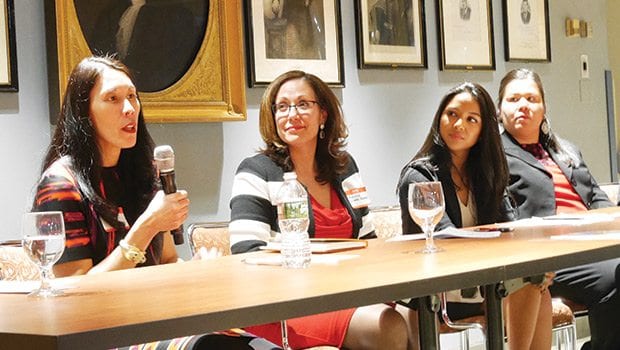Latinas Think Big forum tackles wealth gap
Summit covers prosperity barriers and solutions

Latinas Think Big, a global network and online platform aiming to advance Latinas’ ventures and careers, held a national summit last week in Cambridge. The event centered on the topic of racial and ethnic wealth disparities and potential pathways to economic prosperity for Latina women in light of the wealth gap.
The April 12 summit at the Harvard Kennedy School was co-sponsored by the HKS Office of Student Diversity and Inclusion, Office of Degree Programs and Student Affairs and the Women and Public Policy Program along with Latinas Think Big.

Author: Sandra LarsonAna Muñoz (l), researcher at the Federal Reserve Bank of Boston, discusses findings from “The Color of Wealth in Boston” with Dharma E. Cortéz at the Latinas Think Big summit April 12.
Ana Patricia Muñoz, assistant vice president at the Federal Reserve Bank of Boston and co-author of the 2015 report, “The Color of Wealth in Boston,” discussed some sobering findings and implications of her research.
Whites in Boston are far more likely than nonwhites to own all types of financial assets such as savings, stocks, retirement accounts — “by huge margins,” she noted in a conversation with Dr. Dharma Cortés. This mirrors a national wealth gap that has come to light in recent years. In addition, nonwhites tend to carry heavier student loan and medical debt burdens, hindering the pace of asset building.
The wealth gap has developed over hundreds of years, Muñoz explained, with roots in policies that include slavery, land-taking from Mexicans, redlining that prevented home loans in black neighborhoods, unequal racial/ethnic benefits from the huge public money expenditures of the New Deal, and predatory subprime lending to blacks and Latinos in the run-up to the recent recession.
One of the biggest surprises, Muñoz said, was seeing that education is not the equalizer people assume it is. Blacks with bachelors’ degrees or higher have less accumulated wealth than whites that didn’t finish high school, she noted, and even with college education, blacks and Hispanics lag far behind in home ownership.
Muñoz would like to see “bold, big policies” to rectify the wealth gap and break down barriers for families of color. Among her policy ideas are “baby bonds” — for instance, $20,000 or $40,000 granted to low-wealth families as a starting seed money account at birth; guaranteed employment; and stronger efforts to integrate immigrant communities into the economic mainstream.
A panel discussion with Latina leaders and entrepreneurs followed, moderated by Boston Globe editorial writer and former El Planeta editor Marcela Garcia, and talk turned to solutions and strategies.
Funding scarce
Betty Francisco, founder and president of FitNation Ventures, listed some key challenges in Latina entrepreneurial success, including access to capital. Very little venture funding goes to non-white-owned businesses, she said. Latinos tend to tap their friends and families instead, for a limited amount of funding.
Francisco, who has been a lawyer and angel investor as well as a business owner, wants to start a dedicated angel fund focused predominantly on Latino-owned businesses. She is a strong proponent of “helping your own” by acquiring investment power.
“Why not go into venture capital and private equity and become the one who allocates those investments?” she said. “We need to educate and train more of us to go into these careers. That’s the only way we’re going to change the way investments are done in this country.”
Monica Ramirez, director of the National Hispanic Leadership Agenda, said she comes from a family of migrant farmworkers. Now, as an attorney, she has certain privileges and credibility, she said — and with that she feels a responsibility.
“It’s our job to lift up others’ voices and get them into these spaces,” she said.
If the opportunity arises to join a board, ask to participate on the nominating committee, advised Nathalie Rayes, U.S. public relations director for Grupo Salinas.
“The nominating committee matters because you can bring other people to the table, people who look like you,” she said. “Boards and jobs — that’s how we create wealth. You have to be an advocate, you have to keep pushing it, every step of the way.”
Also on the panel were Vanessa Calderón-Rosado, CEO of Inquilinos Boricuas en Acción; Judith García, Chelsea city councilor; and Erika Carlsen, program manager at the Gleitsman Fellowship and Latino Initiative at the HKS Center for Public Leadership.
Opportunity knocks
In her opening remarks, Latinas Think Big Founder and CEO Angelica Perez-Litwin described her “aha moment” in founding the network, which has over 13,000 online members. She had been denied a TEDx event license, being informed that they didn’t do “ethnic groups” — despite the fact, as she noted, that Latinas were one of the fastest growing populations in the country.
“When a door closes, I create a new door,” she said. “When a platform does not allow me in, I create a platform. So I’m so thankful that TEDx denied me. That gave me the impetus to create a platform to showcase the thought leadership of Latinas in this country.”
Perez-Litwin urged summit attendees to ask each other what their “big idea” is and how they might support and help.
“Sometimes we really don’t need any more than what we have in the room,” she told attendees as the program ended and they moved to mingle, network and enjoy a spread of food. “We could literally create an organization, a company, with all the talent we have here.”






